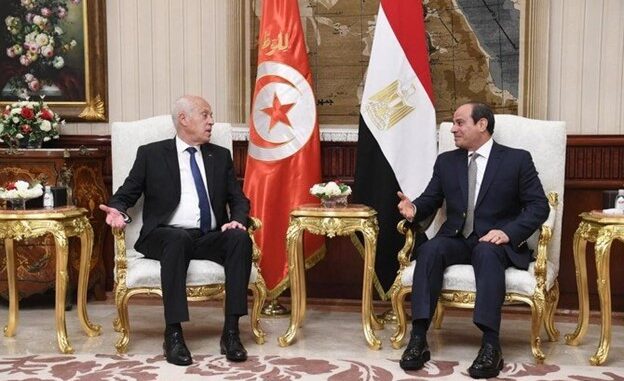
During his first official visit to Cairo, Tunisian President Kais Saied expressed his support to Egypt’s “water security” concerns in the Nile dam row opposing it to Ethiopia and underlined Tunisian and Egyptian support to the national integrity of Libya.
Tunisia will not accept any harm to Egypt’s water security, Tunisian President Kais Saied said on Saturday.
“We look for fair solutions [to Ethiopia’s dam project], but Egypt’s national security is ours and Egypt’s position in any international forum is our position as well,” Saied said during a joint press conference with his Egyptian counterpart Adel-Fattah al-Sisi in Cairo.
Saied arrived in Cairo on Friday for a three-day visit to Egypt for talks on means of strengthening bilateral relations between the two countries.
“We will never accept any harm to Egypt’s water security. We want fair solutions but not at the expense of Egypt and our [Arab] nation,” Saied added.
Sisi has earlier warned Ethiopia against causing any harm to Egypt’s water share by the Grand Ethiopian Renaissance Dam (GERD), which Addis Ababa is building on the Blue Nile, a tributary of the Nile River.
While Ethiopia says the GERD is key to electricity generation and economic development, Egypt fears that the dam project will imperil its water share from the Nile, the country’s only source of freshwater. Sudan, meanwhile, is worried that filling the GERD without an agreement with downstream countries will affect the safety of its own dams.
Years of negotiations between the three countries have failed to make a breakthrough on reaching an agreement on the filling and operation of the GERD.
Since the fall of the Hosni Mubarak and Zine el Abidine Ben Ali regimes in 2011, this will be just the second official visit of a Tunisian head of state to Cairo. His predecessor, Beji Caid Essebsi had met with Egypt’s Sisi during the 26th Arab Summit in Cairo and made an official trip in October 2015 to mark the re-launch of the Egyptian-Tunisian high joint committee, a barometer of bilateral relations.
Relations between the two countries hit a cold patch with the ouster of Mohamed Morsi and the Muslim Brotherhood from power in 2013. The Ennahdha party, which was in power in Tunisia, had given its support to the brotherhood and boycotted Sisi, even fearing that the overthrow of Morsi in Cairo would inspire a similar action in Tunisia.
Since then, the Nile has flowed under the bridge: Saied, whose prerogatives extend to foreign policy, has gained confidence. He is working on a foreign policy free from ideology.
Tunisia’s President also spoke by phone with his Egyptian counterpart on 27 March, during which he assured him of Tunisian support on the issue of the Ethiopian dam on the Nile.
Beyond the symbols, economic relations between the two countries are weak and unbalanced. Some 312 Tunisian companies in the services, industry, tourism and agriculture sectors invested in Egypt in 2018, to the tune of $802m. In Tunisia, the volume of Egyptian investments amounts to $2.2m, divided between a tobacco factory and another in the furniture and appliances sector.
Investment and the opening of shipping lines will certainly be on the agenda of the talks between Sisi and Saied, but they will devote their attention to the Libyan situation, which concerns both countries.



